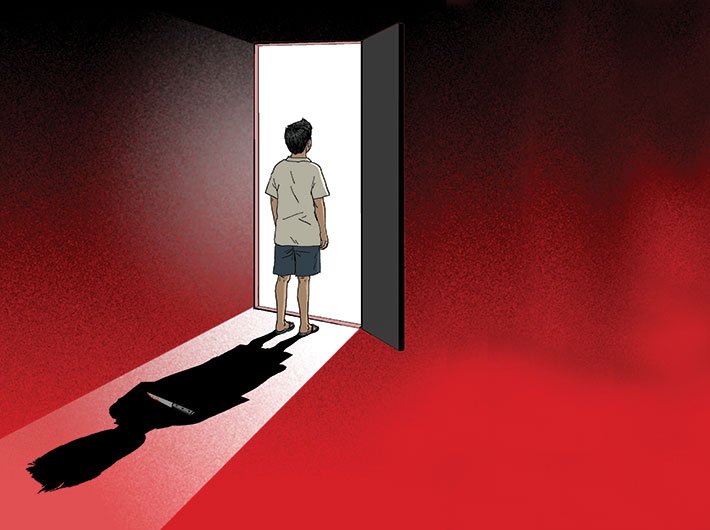With juvenile offenders, reform rather than punishment should be the driving idea
Like our jails, our correction centres for juvenile offenders are hardly conducive to bringing about positive change. No one will dispute the fact that an underaged criminal, especially if he or she is a first-timer, needs to be given a chance to reform, however heinous the crime. Unfortunately, society’s ideas of justice are so linked to punishing the offender that we do not give a chance of reforming to those who have the greatest possibility of reforming – young offenders.
Right from the investigation stage, which is given over to a police force with no training or sensitisation towards handling the young, through the prosecution stage, conducted by justice boards prone to handing out platitudes, and to the correction homes which are crucibles of violence, there is hardly any scope for a young and troubled mind to survive untraumatised. Rare is the case in which an offender grows into a well-adjusted, stable and responsible citizen. Most end up leading a life of crime or wasting their lives, unfit for jobs or unable to keep them. Alcoholism or addiction becomes additional complication in their lives.
Since the idea of punishment dominates our thinking, such a descent into a living hell is seen as well-deserved.
But we will all agree that more often than not, young offenders end up in trouble with the law because they have absorbed violence from what they have seen around them – in society, in their families and neighbourhoods, and in the media. Sometimes, their offences are acts of stupidity or mindlessness. And sometimes, purely the result of chance – being in the wrong place at the wrong time in the wrong company. If our society recognises this sufficiently enough to have juvenile offenders tried separately, it could do better than to let these lives go wasted.
Psychologists and counsellors are unanimous in their view that, as with jails, the biggest reforms needed are in the correction centres for juvenile offenders. Bullies rule the dorms and as a result newbies are forced to join gangs for their own safety. The payoffs they are forced to make for protection are demeaning – slaving for the gang leader, making payment or offering service outside the centre once the term is served, taking part in gambling and drug-chasing. There are fights in which razor blades and improvised weapons are used. Sexual abuse, by older inmates as well as ward staff, is rampant. How can reformation ever be possible in such circumstances!
Compare that with the Neustrelitz prison for young offenders in Germany. The prison is unique in that it isn’t for juveniles but for those aged 19-25, and is aimed at keeping them from becoming hardened criminals. That speaks of the confidence German society has in their ability to reform. In India, however, it is taken for granted that offenders as young as 12 and 13 are incorrigible. In Neustrelitz, all inmates have to undergo therapy, study, hold jobs, take part in sports, and care for animals like sheep, goats and rabbits as part of sensitisation. Males and females (who have separate rooms) are housed together and expressions of tenderness – even consensual sex – are not frowned upon. All that the warders do is try to keep inmates as busy as possible. The driving philosophy is to make prison life no different from life outside so that when inmates are released, they don’t find it difficult to adjust.
While achieving that may be a far cry in our correction centres for juveniles, some changes are definitely possible. For one, expert counsellers, whether those in government service or in private practice, can be asked to provide their services at these centres. Leading professionals, artists, performers and people from different trades should be invited to mentor small groups of inmates and see that by the time they finish their time at the centre, they are ready to train for jobs outside. Being mentored by successful people can be a very strong motivation and inspiration for change. The government should think of providing incentives, which need not be monetary, for such counselling and mentoring.
Proper, rigorous education, sports and fitness activities should be made mandatory. For those with no inclination for formal education, vocational training should be provided. By setting inmates small goals to achieve first and gradually increasing the level of difficulty, their confidence in their ability to create a good future for themselves can be achieved. In this process, counsellors can help inmates find their own unique abilities and talents.
Most important, however, is improving inmates’ emotional quotient. The success of meditation programmes at Tihar jail has been much written about. These should not be too difficult to replicate at juvenile correction centres. Along with that, counsellors could teach inmates how to pay attention to how their thinking directs their behaviour and how, by changing their thinking, they can change their behaviour. Anger management and the basics of habit change could also be taught so that inmates are able to apply it to their lives in the long term.
But to achieve all this, it is necessary to stop thinking of punishment in the same breath as justice.
(The column appears in the March 31, 2018 issue)

